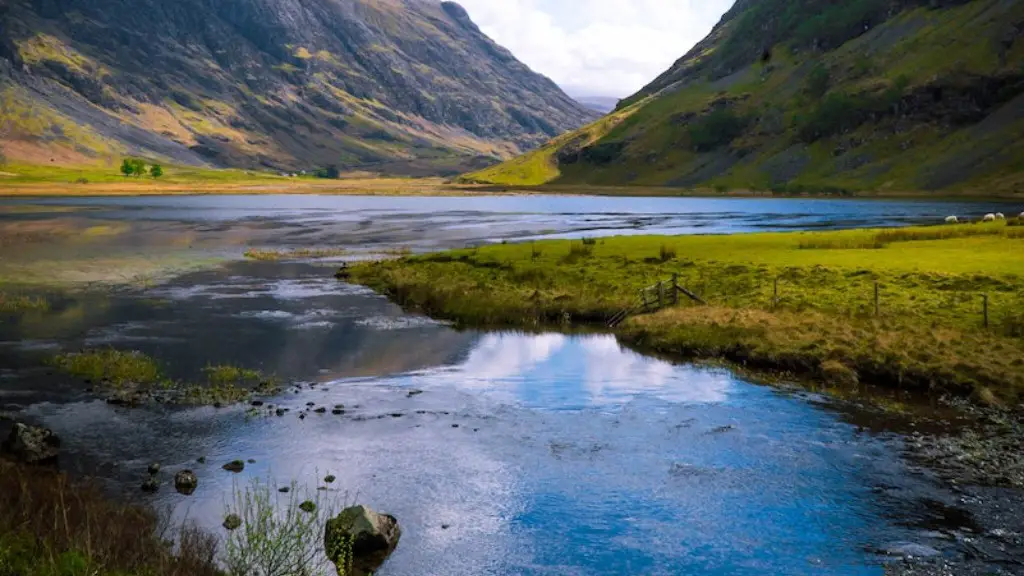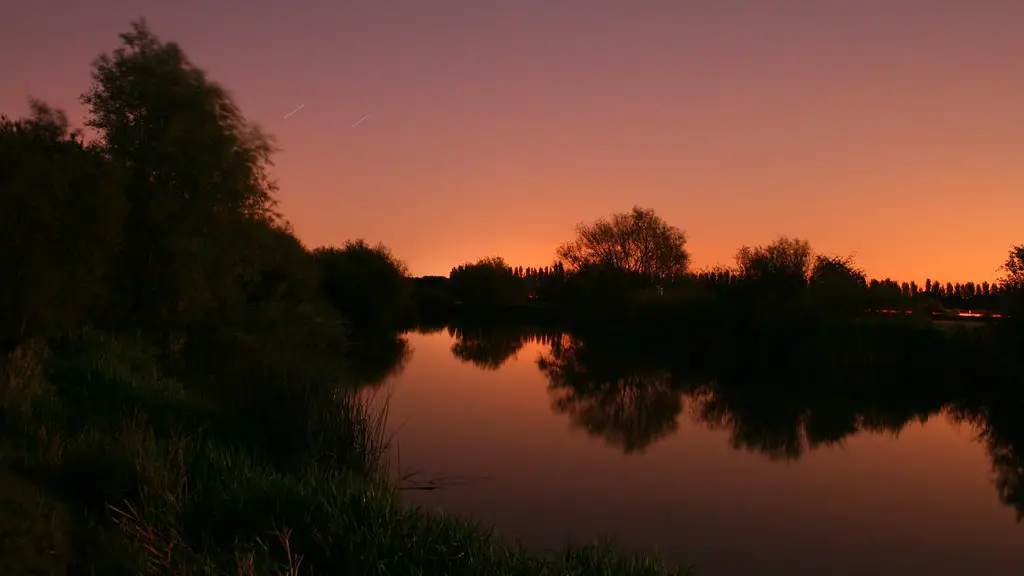Ancient Egypt and the Nile River
The land of Ancient Egypt has a long, impressive history with its relationship to the Nile River. It is written that the people developed a highly organized, complex culture and government with the assistance of the fertile land along the fertile banks of the Nile River. The two were, in a sense, inseparable – the people of Egypt built their society, celebrated their culture and advanced their technology with the assistance of the Nile River. As a result, understanding the relationship of the Nile to Egypt is fundamental to understanding its history.
The Nile River is the world’s longest river, with a length of 6695 kilometers (4184 miles). It runs through 11 countries in Africa, and is ultimately responsible for providing water, agricultural land and transportation to millions of people in Eastern Africa. It was also crucial in shaping the geography and culture of Ancient Egypt. It is estimated that 89% of Egypt’s population lives near the Nile, and that approximately 39.4 million people live in the Nile River basin.
The ancient Egyptians relied heavily on the annual flooding of the Nile for agriculture, and believed that their civilization was divinely blessed. Modern historians believe that it was this reliable and regular water dependence that enabled the ancient Egyptians to develop from a small nomadic group to one of the most advanced civilizations in the world.
In terms of geography, it’s worth noting that the majority of the Nile River is located outside of Egypt, with much of the river belonging to Sudan, Ethiopia, Uganda, and other African countries. Out of the river’s 6695 kilometers, around 1725 kilometers are located in Egypt – that’s just over a quarter of the total length.
Today, the Nile is just as important as it was thousands of years ago to the Egyptians. Approximately 95% of Egypt’s water comes from the Nile River, and is used for drinking, agriculture, industry, and transportation. Even small changes in the Nile’s water level can have drastic impacts on the people of Egypt.
The Nile River is an incredibly important resource for Egypt and its people, and the government is continuously investing in projects to better utilize the river’s resources for the benefit of the people. The Egyptian government is working on numerous irrigation projects, dams, and water management projects to better utilize the water from the Nile – all of which have provided very positive results.
Impact of the Nile River on Egypt’s Economy
The Nile River plays an important role in strengthening the Egyptian economy. Not only does it provide water and agricultural land, but it is also a major source of power, with the Aswan Dam generating 14.2 billion KWh of hydroelectric energy. This hydroelectric energy has made it easier for businesses within and outside the country to operate.
The Nile River also impacted Egypt’s economy due to the international trade it allowed for. Egypt was once an essential stop on international trade routes, as goods and resources moved up and down the river. This allowed for an influx of people, resources, and ideas, which enabled Egypt to become an economic powerhouse in the ancient world.
The Nile River is also an important source of tourism revenue for Egypt. Every year, thousands of people from around the world come to Egypt to visit the monuments and ancient sites along the banks of the river – such as the Pyramids of Giza, the tombs of Luxor and the Valley of the Kings. Tourist revenue helps the country generate much needed income which, in turn, helps to fund infrastructure projects – such as the damming of the Nile River and the construction of transportation and communication hubs.
Today, the Nile River is one of Egypt’s most important resources, enabling economic growth and opportunity. Foreign and domestic investments are flooding the country, which has allowed for increasingly efficient infrastructure and technology investments, as well as greater access to water and electricity.
The Environmental Impact of the Nile River
The impact of the Nile River on the environment has been, historically, mostly negative. The Nile River has been a source of major environmental issues, including soil erosion and water pollution. In recent years, the Egyptian government has taken significant steps to reduce the environmental impact of the Nile, however, many issues still remain.
Soil erosion has been an especially significant problem, as much of the soil along the shores of the Nile River has been degraded due to years of over use and pollution. This has had a drastic impact on crop production, and has resulted in decreased yields and profits for local farmers.
Water pollution is another ongoing problem. Much of the water in the Nile is contaminated with industrial and agricultural waste. This waste is a major source of waterborne illnesses, including diarrhea, typhoid, and cholera. It is estimated that without proper water treatment and filtration, millions of people living in Egypt are at risk of severe illness or even death.
The Egyptian government has begun to implement programs to reduce the negative environmental impact of the Nile River, such as the establishment of a system of wastewater facilities and desalinization plants that can be used to filter the contaminated water. The government has also increased the penalties and fines for companies that are found guilty of polluting the Nile.
Despite governmental efforts, the environmental impact of the Nile River is still widespread and very dangerous. It is up to the government, in conjunction with the international community, to protect this crucial resource and ensure its long-term sustainability.
Environmental Conservation Efforts
In recent years, the Egyptian government has taken significant steps to conserve the environment and protect the Nile River. International agencies, such as the United Nations, have worked closely with the governments of the 11 countries along the Nile to ensure that the river is managed and utilized in an efficient, sustainable way.
In addition, the government has implemented strict regulations about the amount of water that can be used for industrial, agricultural and domestic purposes, and has increased the penalties for wasting water. There is also a greater emphasis on water conservation and recycling, with new water treatment plants and efficient irrigation systems being constructed throughout the country.
Moreover, the government has also promoted the use of renewable energy sources, such as solar and wind. This has led to a significant decrease in the amount of water needed to generate electricity, allowing for greater sustainability and preservation of the Nile River’s resources.
The Nile River is a precious resource in the Middle East, and the Egyptian government is working hard to protect and manage it in a responsible and sustainable way. It is important that the international community continues to work together in order to ensure the future prosperity of the region.
The Future of the Nile River
Despite its critical importance to the Egyptian people, the future of the Nile is uncertain. Climate change is a major concern, as rising temperatures and decreased rainfall threaten the regular flooding that is essential to the agricultural processes in most of Egypt. In addition, population growth and the increasing demands on the river’s resources are also placing immense pressure on the river.
The government has addressed these issues with numerous programs, such as the construction of dams, increased water efficiency and greater investment in renewable energy sources. However, there is still much work that needs to be done in order to ensure the long-term sustainability of the Nile River.
The Egyptian government is committed to preserving the Nile River, and is working closely with the international community to develop and implement strategies that will ensure its long-term health and prosperity. It is up to the government and the people of Egypt to protect this precious resource and ensure its future.





